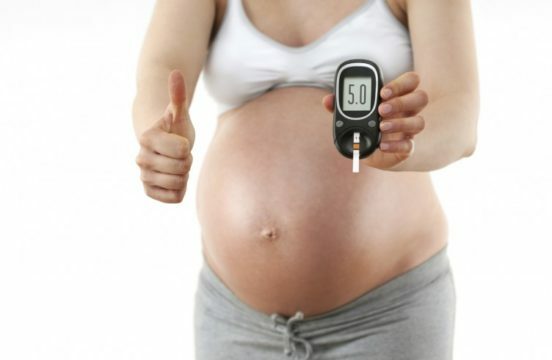Diabetes mellitus does not exclude the possibility to endure and give birth to a healthy child. In case of type 2 disease, pregnancy should be planned and under the supervision of specialists. Depending on the health status, the level of sugars, not every period will be favorable for conception.

There is also another form of diabetes - gestational( diabetes of pregnant women), this type manifests itself during the gestation and requires close monitoring by doctors. With the development of such a disease, the expectant mother can observe the accompanying symptoms and consult a doctor.
Causes and mechanisms of diabetes mellitus development
Such a disease as type 2 diabetes mellitus( non-insulin-dependent) is manifested in women, mainly in middle age. Factors of this violation of metabolism and the development of hyperglycemia( increase in glucose levels) can be obesity, improper nutrition, with the predominance of fast carbohydrates, as well as hypodynamia or hereditary predisposition.
This type is characterized by a lack of sensitivity of the body tissues to insulin, while it continues to be produced in the required volume. The result is an excess of the level of sugar in the peripheral blood, which leads to hyperglycemia and various complications. Excess sugar causes vessel spasms, kidney dysfunction, hypertension develops.
Pregnancy planning
Unplanned pregnancy with type 2 diabetes mellitus can lead to the most negative consequences for both the future mother and fetus:
- complication of diabetes on pregnancy, development of hypoglycemia, ketoacitosis;
- complications in the operation of blood vessels, the progression of diseases such as coronary heart disease, nephropathy;
- gestosis( toxicosis in the late stage of pregnancy, it is characterized by high blood pressure, swelling);
- immaturity of the fetus with a significant mass( excess glucose can lead to a newborn baby's weight of 4-6 kg).
- loss of the lens or retina of the mother's eye, impaired vision;
- placental insufficiency or placental abruption;
- premature birth or miscarriage.
A child eats glucose from his mother, but at the stage of formation he is unable to provide himself with the necessary insulin norm, the lack of which is fraught with the development of various vices. This is the main threat to the future baby, the percentage of the genetic heritage of this disease is quite low, if only one of the parents suffers from diabetes.
When diagnosing type 2 diabetes, pregnancy planning implies good compensation, the selection of the optimal dose of insulin and the normalization of daily sugar values. Such a result is difficult to achieve in a short time, but the same measures are aimed at reducing the risk of complications, because during pregnancy, the body must provide two.

In addition, the doctor may prescribe several hospitalizations: when registering for examination, taking all tests and prescribing insulin;during pregnancy, hospitalization is prescribed only when necessary, when indicators can mean a threat to the life of the child or mother;before giving birth.
The influence of excess weight
Another important stage in pregnancy planning will be the right balanced diet, exercise( within the limits of the doctor).Act better in advance, although it can not be overlooked that losing weight is useful in itself, and not just before pregnancy.
Excess body weight is observed in most women, this symptom is noted only in the presence of acquired type 2 disease. In addition to the known negative consequences of excess weight on blood vessels and joints, obesity can become an obstacle to conception or natural childbirth.
Fetal wear exerts an additional strain on the entire body, and in combination with excess body weight and diabetes mellitus, serious health problems are likely.
A nutritionist or an endocrinologist will help you make the right diet. It is erroneous to consider weight gain during pregnancy as natural, the need for energy really increases, but excess of subcutaneous fat indicates over nutrition or dysfunction of metabolism.
How the birth of
takes place Full control of sugars and strict adherence to the recommendations of specialists will allow to give birth to a child in a natural way. Also, with diabetes, caesarean section can be prescribed when complicating factors are present:
- in severe form of gestosis;
- if the child's weight is more than 4 kg;
- in the absence of the ability to monitor glucose;
- with kidney damage;
- when placental abruption occurs;
- with fetal hypoxia.
As a rule, deliveries take place in a specialized hospital for women with diabetes mellitus. In the absence of such an examination, an endocrinologist is required. After the birth of a child, the need for insulin decreases, the specialist adjusts the dose and gives the necessary recommendations. With positive tests and the well-being of the mother and newborn, breastfeeding is acceptable.
Gestational diabetes
This form of the disease is first manifested and diagnosed during gestation. The development of the disease is caused by a decrease in the resistance to glucose( a violation of carbohydrate metabolism) in the body of the future mother. In most cases, after delivery, glucose tolerance returns to normal, but about 10% of parturients remain with signs of diabetes, which later become a type of disease.
Factors that may interfere with the correct functioning of the carbohydrate metabolism:
- the age of the pregnant woman is from 40 years;
- smoking;
- is a genetic predisposition when relatives are diagnosed with diabetes;
- with a body mass index of more than 25 before pregnancy;
- a sharp increase in weight in the presence of excess body weight;
- birth of a baby weighing more than 4.5 kg earlier;
- fetal death in the past for unknown reasons.
The doctor appoints the first glucose tolerance test for registration, if the tests show a normal sugar content, then a second examination is scheduled for 24-28 weeks of gestation.
Not always the first signs of diabetes of pregnant women are determined immediately, more often the symptoms are attributed to a minor malfunction in the body against the background of bearing the child.
Nevertheless, if there is frequent urination, dry mouth and a constant thirst, weight loss and loss of appetite, increased fatigue, it is worthwhile to see a doctor. If such signs of the disease are manifested, the clinic specialist assigns the necessary tests. Mindfulness of the body will avoid doubts and timely determine the onset of diabetes.




